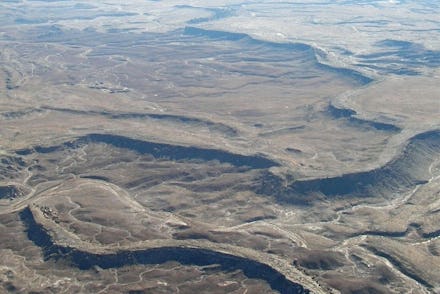Fossilized rivers on Mars' surface suggest the red planet had a warmer, wetter climate

Scientists have found over 17,000 kilometers of fossilized river beds in a region on Mars called Arabia Terra.
This is the latest discovery in a growing body of evidence that Mars used to be a warm wetland instead of the cold desert it is today.
"Climate models of early Mars predict rain in Arabia Terra and until now there was little geological evidence on the surface to support this theory," lead author on the new research paper Joel Davis explained in a statement.
What this means: A warm, wet environment would make Mars a more "favorable" place for life, according to Davis.
The Arabia Terra channels are about 30 meters deep and span one to two kilometers across, so it's likely huge rivers once ran through the area.
"Arabia Terra was essentially one massive flood plain bordering the highlands and lowlands of Mars," Davis said.
The researchers estimate water flowed in the channels between 3.7 billion and 3.9 billion years ago.
Future exploration: It's possible that some evidence of past life was preserved in the channels, so the researchers say this would be a good spot for future missions to explore. One of the channels is actually a potential landing spot for the European Space Agency's ExoMars rover, which will launch sometime in 2020.
The rover is built to collect samples from Mars and search for signs of life.